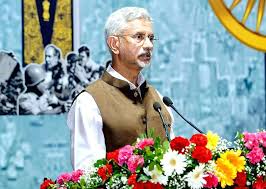Indian fishermen getting arrested in Sri Lanka due to pact inked during Emergency: S Jaishankar

For years, Indian fishermen—mostly from Tamil Nadu—have faced arrests and detention by the Sri Lankan Navy for allegedly entering their waters illegally. This persistent maritime dispute recently resurfaced with renewed political weight after India’s External Affairs Minister S. Jaishankar claimed that a pact signed during India’s Emergency era is at the heart of the problem.
A History Revisited: The 1974-76 Maritime Agreements
At the center of the controversy lies the Katchatheevu Island and the surrounding waters, long used by Indian fishermen for generations. During the Emergency imposed by then Prime Minister Indira Gandhi, a maritime boundary agreement was signed with Sri Lanka in 1974, followed by another in 1976.
Under these agreements:
- Katchatheevu Island was officially ceded to Sri Lanka.
- Indian fishermen lost traditional fishing rights in Sri Lankan waters.
- These treaties were signed without extensive parliamentary debate or approval.
According to Jaishankar, these decisions—made without democratic processes—continue to cause severe hardship to Indian fishermen nearly five decades later.
“The decision to give away Katchatheevu and our traditional fishing grounds was taken unilaterally during the Emergency. That agreement has led to the current arrests and harassment of our fishermen,” Jaishankar said in Parliament.
Rising Arrests and Diplomatic Strain
The statistics back Jaishankar’s concern. In 2024 alone, more than 528 Indian fishermen were arrested by the Sri Lankan Navy, often while fishing in the Palk Strait, a narrow stretch of water separating Tamil Nadu and Sri Lanka.
As of early 2025, dozens of fishermen and several boats remain in Sri Lankan custody. In just one incident in March 2025, Sri Lanka detained 97 Indian fishermen and seized 227 boats. These arrests have triggered recurring diplomatic interventions, legal proceedings, and distress among coastal communities in India.
Political and Public Outcry in Tamil Nadu
The issue of Indian fishermen being arrested has always had deep political implications in Tamil Nadu. The DMK-led government has been vocal in demanding diplomatic resolutions and even revisiting the original agreement.
Tamil Nadu Chief Minister M.K. Stalin has argued that the central government must act decisively to protect traditional fishing rights, and if needed, renegotiate with Sri Lanka.
Additionally, opposition parties have criticized the current government for blaming the past without offering a viable, long-term solution. However, the BJP has turned the spotlight on the Congress Party, blaming it for signing away strategic and cultural assets like Katchatheevu during an undemocratic phase in India’s history.
What Makes Katchatheevu So Significant?
Located about 33 kilometers off the Indian coast, Katchatheevu is a tiny, uninhabited island in the Palk Strait. Though physically small, its importance is massive for Indian fishermen:
- It served as a traditional resting and drying spot for fishing nets.
- Many Indian fishermen believe they have ancestral rights over these waters.
- The island hosts the St. Anthony’s Church, which is visited annually by Indian Christian pilgrims.
Although India ceded Katchatheevu, the 1974 agreement did allow Indian pilgrims to visit the island without visas, and recognized “historical rights” of Indian fishermen. However, the 1976 follow-up agreement practically nullified those rights, banning fishing by either country’s nationals in the other’s waters.
Jaishankar’s Sharp Criticism of Emergency-Era Governance
Jaishankar’s remarks take aim not only at the agreement itself but at the political context in which it was signed.
“The agreement was inked during a time when democracy had been suspended. It bypassed Parliament. And decades later, it’s the fishing community that continues to pay the price.”
This comment aligns with recent efforts by the BJP to highlight historical missteps by previous governments. Prime Minister Narendra Modi has also questioned the wisdom of giving away a strategically located island without due consultation.
The Road Ahead: Possible Solutions?
Resolving this long-standing issue isn’t easy, but a few measures are under discussion:
- High-level diplomatic talks to create a joint fishing corridor or seasonal access.
- Modernizing fishing fleets to avoid crossing international waters.
- Compensation and support for affected fishermen.
- Surveillance and mapping of maritime boundaries with better technology.
- A regional fishing agreement involving both governments and local communities.
However, Sri Lanka remains firm on protecting its maritime rights, especially after civil war-era experiences with arms and smuggling via the sea. That makes a full reversal or withdrawal of the 1970s treaties unlikely.
Conclusion: A Legacy That Still Hurts
Jaishankar’s statements have reignited national attention on a decades-old issue that still affects thousands of Indian families. Whether viewed as a historic blunder or a necessary geopolitical compromise, the reality remains that Indian fishermen are paying the price of decisions made generations ago.
While political blame games continue, the demand from coastal communities is clear: secure, sustainable fishing rights, and above all, freedom from fear every time they venture out to sea.






